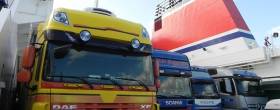Displaying items by tag: Reduced CO2 Emissions
Encouraged by Sustainability Report Findings at Stena Line
#CO2reduced - Strategic efforts to reduce its environmental footprint at Stena Line is well on course according to a recent company report. Last year the ferry operator cut emissions of sulphur by 53%.
Stena AB’s Sustainability Report for 2015, which was recently published, shows reduced fuel consumption and lower emissions for the shipping companies within the shipping group. Stena Line has exceeded its targets for reduction of emissions of both sulphur and CO2.
One of the largest changes to affect the shipping industry was introduced in 2015 with tough new regulations on sulphur emissions being laid down for ferry operators in Northern Europe. This regulation means that the permitted emission levels of sulphur from vessels has been reduced from a maximum 1 per cent to 0.1 per cent within the SECA area from January 1st 2015.
For Stena’s shipping companies, with 93 vessels operating all over the world, the new rules have resulted in a reduction of over 4,000 tonnes of sulphur from 2014 to 2015, which represents an impressive 15 per cent reduction. For Stena Line’s 34 vessels operating in Europe, 24 of which operate within the SECA area, the total emission of sulphur has been reduced by 53 per cent.
Carl-Johan Hagman, CEO at Stena Line, said: “Focusing on sustainability is not only a priority for Stena Line, but for the entire industry which needs long term sustainable fuel options to maintain its competiveness. We are currently conducting several initiatives looking at alternative fuels within Stena. Our Methanol Project on Stena Germanica is one example. We are also looking at battery powered vessels, which is now starting to become an interesting option for shipping.
“Since 2015 Stena’s shipping companies have been delivering a dedicated program called the Energy Saving Programme (ESP), to reduce fuel consumption. The target is a reduction of 2.5 per cent annually and the result for 2015 was a reduction of 2.8 per cent. For Stena Line the efforts led to a reduction of fuel consumption of 4 per cent per nautical mile and a reduction of CO2 emissions of 2.5 per cent per nautical mile,” concluded Carl-Johan.
Erik Lewenhaupt, Head of Sustainability, Stena Line, said: “We have a broad scope and are currently driving several different initiatives in a bid to reduce our fuel consumption within ESP. It covers everything from changing bulbs and propellers to enabling our ferries to sail with reduced water resistance. Other initiatives include using digital solutions such as our Fuel Management System, where we collect a huge amount of data from the systems onboard our 34 ferries which is them analysed and used to optimise our day to day operations. We have set an ambitious target of trying to reduce CO2 emissions by 35% per nautical mile by 2030.”
























































